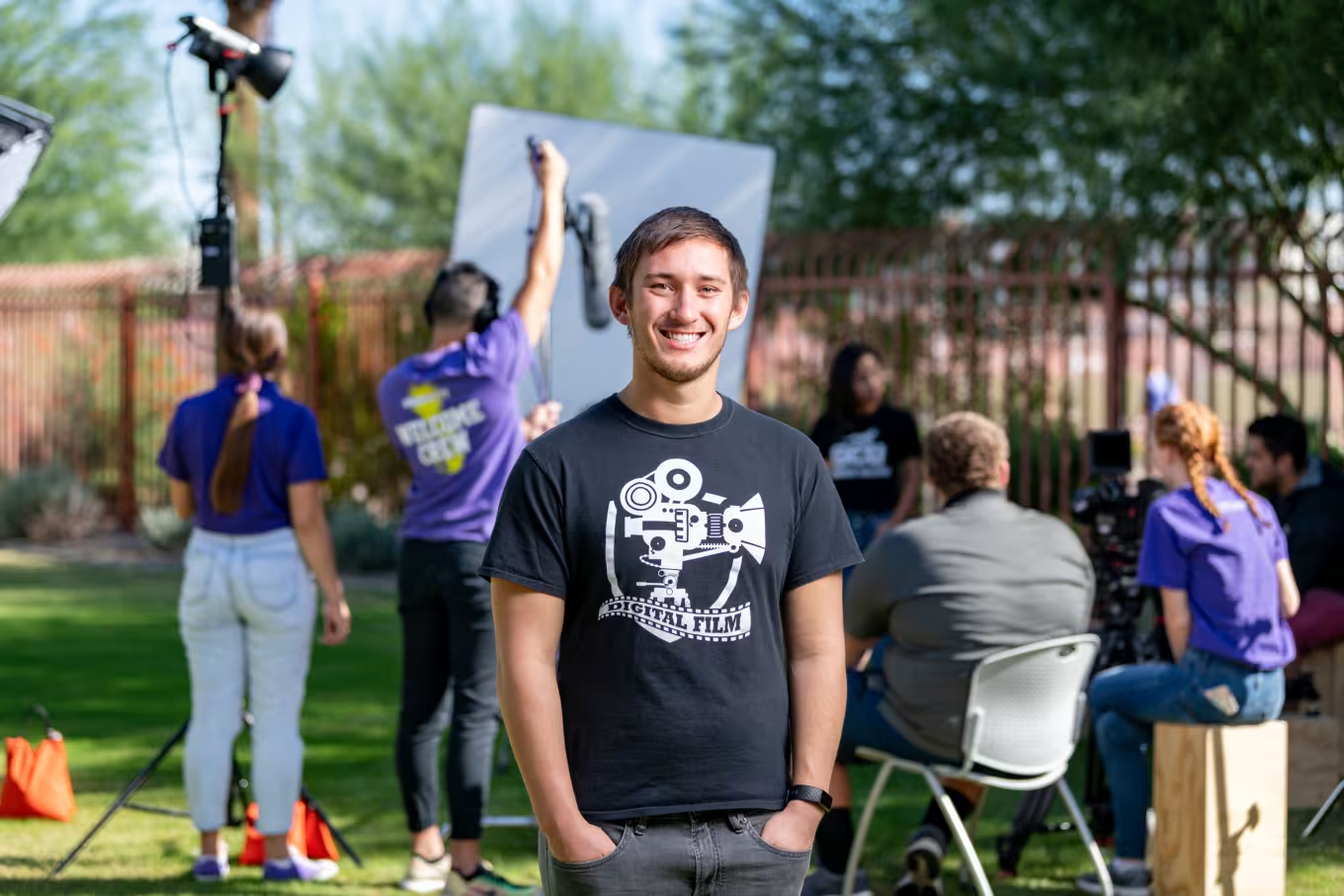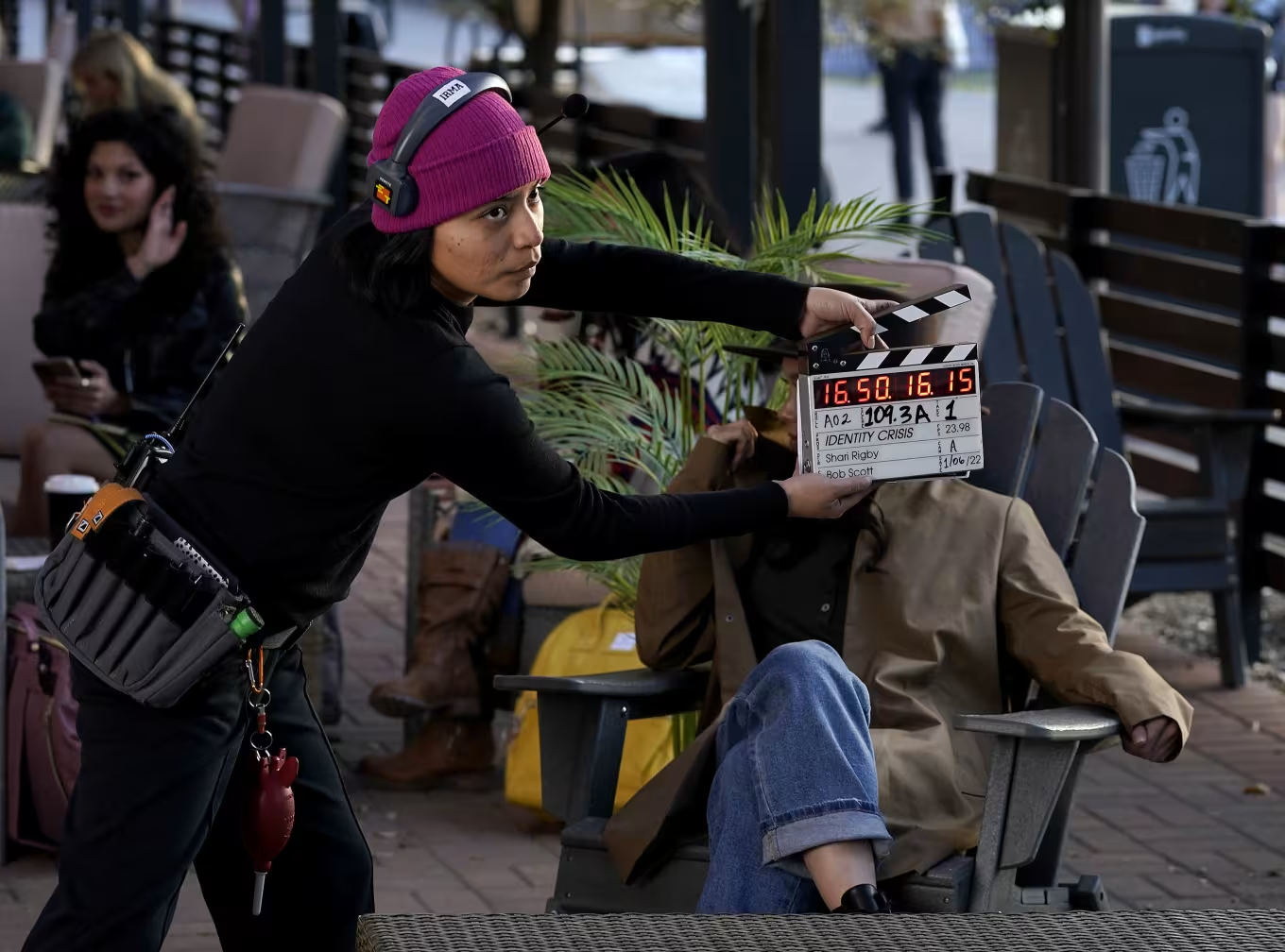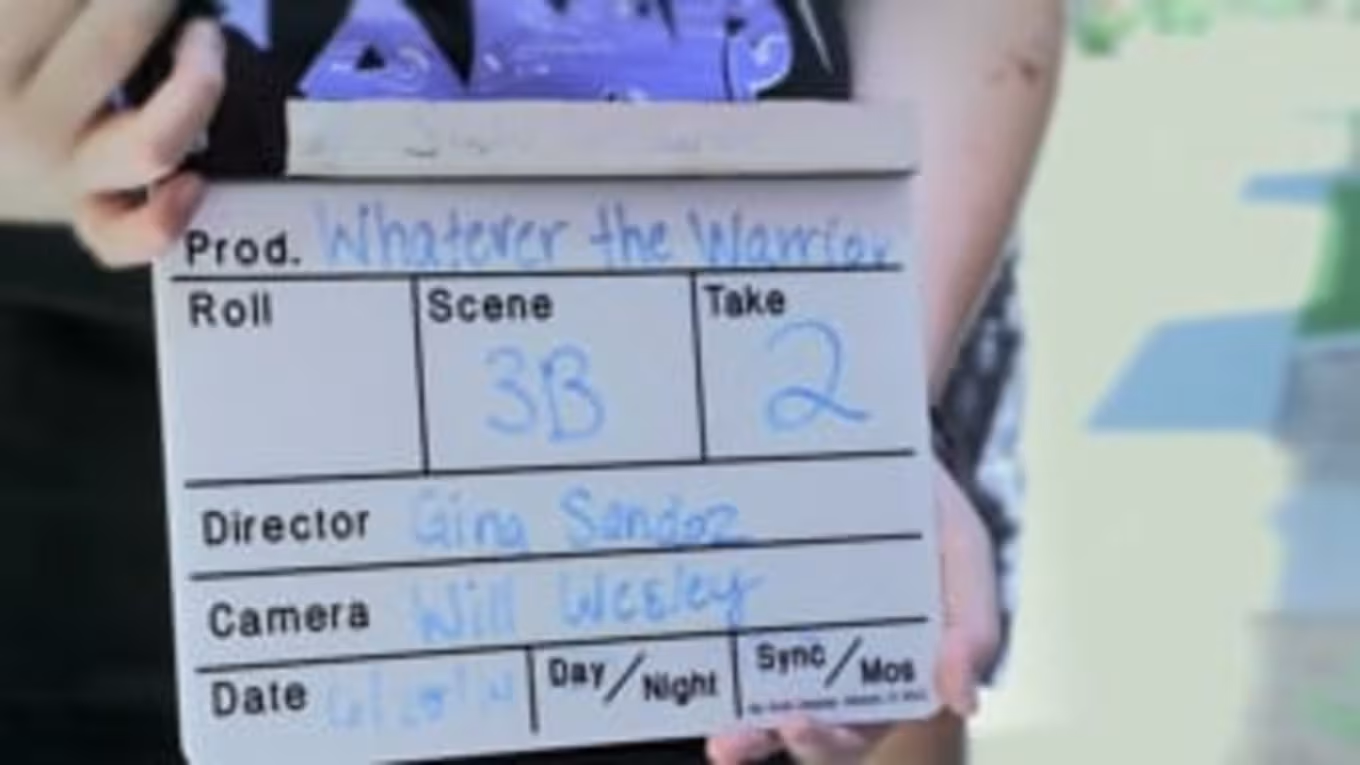
BA in Digital Film: Screenwriting Emphasis
journey today.
Films can be informative, entertaining or inspiring. They can both reflect and become part of cultural ideals and values. If you have a passion for film and screenwriting, you can build a strong foundation by fueling your creative aspirations and honing your storytelling skills with a Bachelor of Arts (BA) in Digital Film with an Emphasis in Screenwriting from Grand Canyon University.
Delve into film and screenwriting competencies and prepare to pursue a potential career in pre-production. Whether taking these screenwriting classes online, on campus or in the evening, you will explore effective strategies in story development, practice creating authentic dialogue, and build characters that audiences can connect with.


This bachelor’s degree in film: screenwriting emphasis is offered by the College of Arts and Media. The comprehensive film and screenwriting curriculum covers genre-specific screenwriting techniques, as well as other types of writing styles for a well-rounded education. You will explore the adaptation process for transferring a story from another medium into digital film.
The screenwriting classes can also provide opportunities for you to develop an in-depth understanding of the business side of film creation and the various movements within cinema throughout history. Additionally, you will explore aspects of film creation in the production stage, such as cinematography and directing.
Each screenwriting course integrates the Christian perspective and values into the curriculum. As a
private Christian university, GCU encourages you to grow into a mindful servant leader who actively evaluates ethical dilemmas and searches for moral solutions.
Take Online Screenwriting Courses
GCU strives to make higher education accessible to all regardless of geographic location or learning modality preference. You can complete online screenwriting courses via our interactive e-learning platform and enjoy the same quality of curriculum and instruction as our on-campus students. With greater convenience and flexibility, online screenwriting classes may place higher education within reach for more students. Plus, you’ll still be able to enjoy stimulating discussions with peers and instructors online.
Become a student of human nature by transferring authentic experiences and genuine interactions to the written word. Immerse yourself in the world of professional film and screenwriting with classes that cover topics such as:
You’ll also explore strategies for writing meaningful dialogue that encompasses each character’s unique voice, as well as the process of adapting various forms of media to screenplays.
Gain Practical Screenwriting Experience

During your senior year, you will take a capstone course in which you will be asked to demonstrate your understanding, skills and creativity by cultivating a screenplay project.
The capstone screenwriting course can help bring together what you have been taught, including:
Upon completion, you may have multiple well-developed screenplays in your professional portfolio, which is intended to highlight your career qualifications as you pursue your professional ambitions.
Screenwriters pursuing a career in the film industry may choose to be generalists or to focus on a particular genre of film. For example, some screenwriters prefer to write comedy, science fiction, drama or horror movies. Others may focus on adapting writing from other forms, such as novels into screenplays.
Screenwriters often work out of a home office, as most of them are contract-based, self-employed professionals. They may be commissioned by production companies or write scripts “on spec” (speculation) with the aim of getting the scripts picked up by production companies. Some screenwriters are represented by a talent agency or booking agent, who represents the screenwriter’s best interests and helps connect them to jobs.3
Estimated job growth rate for many types of writers and authors (including screenwriters) from 2022 to 20321,2
Our Christian university is proud to be institutionally accredited by the Higher Learning Commission since 1968. The College of Arts and Media shares the university’s commitment to upholding the principles and standards established by our accrediting bodies. With a focus on guiding students toward achieving their dreams, GCU is pleased to provide a quality education via a comprehensive curriculum and engaged instructors who are knowledgeable in their fields.
BA in Digital Film: Screenwriting Emphasis FAQs
While you are reflecting upon your potential career pathway, it can be helpful to conduct some additional background research on your options. You can use the following frequently asked questions and answers as a starting point for your research to guide your decision-making process.
This answer likely depends on where your personal passions and career interests lie. If you are an aspiring writer who understands the power of the written word and enjoys the creative process of writing, then a bachelor’s degree in film: screenwriting emphasis may be a worthwhile choice for you. On the other hand, there are other film degrees with different emphases to consider. If you’re attracted to the idea of pursuing a career as a producer, then you might instead consider earning a degree that focuses on video production.
Both subfields are showing growth potential. The U.S. Bureau of Labor Statistics (BLS) estimates that job growth for producers and directors will increase by 7% from 2022 to 2032, faster than average.4 Although the BLS does not track employment data for screenwriters specifically, the job growth rate for many types of writers and authors (including screenwriters) is expected to increase by 4% from 2022 to 2032, as fast as average.1,2
No. GCU’s bachelor’s degree in digital film: screenwriting emphasis is more interested in your “voice” and seeks creative writers who can spin a story. To increase your chances of being accepted, you should have basic knowledge of plot structure, dialogue, language and writing skills, creativity to generate original ideas and confidence in your work.
No. A writing portfolio is not necessary to apply, but it may help you stand out. An established portfolio documenting your writing skills may allow you to enter the program with a framework of screenwriting experience.
No matter how you choose to earn your bachelor’s degree in film: screenwriting emphasis, you’ll work through the same curriculum and take the same classes as other students in the program. Online and on-campus students benefit from the same quality of education taught by experienced instructors. The only major difference is that on-campus students have face-to-face interactions with peers and instructors, whereas online students interact with each other through the collaborative e-learning platform.

Pursue your passion for creative storytelling in screenwriting classes taught by experienced instructors. Apply today to earn your digital film degree online or on campus at GCU.
- U.S. Bureau of Labor Statistics (2023, Sept. 6). What Writers and Authors Do. Occupational Outlook Handbook. Retrieved on Dec. 12, 2023.
- COVID-19 has adversely affected the global economy and data from 2020 to 2022 may be atypical compared to prior years. Accordingly, data shown is effective September 2023, which can be found here: U.S. Bureau of Labor Statistics, Occupational Outlook Handbook, Writers and Authors, retrieved on Dec. 12, 2023.
- The Art Career Project. (2021, July 20). Screenwriter. Retrieved on Dec. 7, 2023.
- COVID-19 has adversely affected the global economy and data from 2020 to 2022 may be atypical compared to prior years. Accordingly, data shown is effective September 2023, which can be found here: U.S. Bureau of Labor Statistics, Occupational Outlook Handbook, Producers and Directors, retrieved on Dec. 12, 2023.


